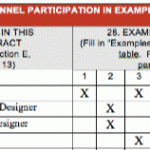
We all have something in our life or our job that, let’s face it, despite our best efforts…
…just doesn’t seem to be working.
Wouldn’t it be great if we could fix that thing?
Today, I’m going to open up and share with you how I solved the biggest problem in my life. And I’m going to let you in on how you can use the “Big Problem Solution” to remove the biggest roadblocks in your life.
But first, let me share my embarrassing “before story.”
The One Universal Truth
There is only one universal truth in this world…
…I am horrible with money.
My challenges with money during my 20s were the stuff of legend (legend of the idiot):
Lived paycheck to paycheck with no savings
Got into a big dispute with credit card company and had collection agencies calling me
Forgot to pay college loan and got default notice
Best friend had to loan me $1,000 just so I could move out of my mom’s house
Many, many overdrafts in my bank account
Yet, today it’s a completely different story. I am by no means rich, but I have more than enough money in my savings. Other than my mortgage, I’m completely debt free.
My credit rating is disgustingly high. For months, Chase has been begging me to increase the limit on my credit card. But I simply have no need for more credit. Sorry Chase.
I straight up paid for the car I drive with cash. And I recently sent my mom on a trip and bought her a high-end gym membership.
I’m not trying to brag. Like I said, I’m not rich…not by a long shot. Instead, I’m trying to show you just how drastic my financial life has changed since I used this “Big Problem Solution.”
Because guess what…
…I’m still terrible with money.
So, let me explain what I did.
I’m Not That Guy
My college roommate was great with money. He tracked every dollar he ever spent in a spreadsheet. He kept a meticulous budget. As soon as a bill came in, he would pay it.
Everybody knows that’s how you manage your money. That’s what you are supposed to do.
I tried all that stuff. I bought software. I tried to track my spending. I tried to set up a budget.
But I forgot to enter purchases into my software. Bills would come in and be thrown into a pile until I forgot about them. Whoops.
I felt like a failure because I couldn’t do this simple thing that “everybody else” did. It felt like I couldn’t operate like a “normal” human being.
I didn’t want to admit to anybody that these “normal” financial best practices were so difficult for me. People would just assume I was lazy, incompetent, or simply lacked motivation.
Luckily, a tragic event helped free me from these misconceptions.
If I Ever Find This Crook…I Might Thank Him
One day, I went to Target. While in the store, my iPod got stolen from my car. My $500 iPod was gone. The cops and Target could only respond with, “sucks for you.”
It might sound like no big deal for you, but that iPod was like Gollum’s ring or Cinderella’s glass slipper. It was precious to me.
I didn’t have $500 bucks to replace it. I didn’t even have a credit card.
I needed to find a way to replace that iPod as quickly as possible with no savings and no credit.
The Big Problem Solution Thesis
For me, the expert’s advice wasn’t going to help. “Getting motivated” wasn’t going to help.
My current “system” wasn’t going to help. So far, it had failed spectacularly.
That’s when it dawned on me. The system that worked for other people simply didn’t work for me. And I was easily able to identify what cog in this system wasn’t working…me.
I didn’t want to track every dime I spent. I didn’t want to remember to transfer money into my savings account. I didn’t want to develop and maintain a personal budget.
I needed a different system.
You see, here is the thesis of the “Big Problem Solution:”
The systems that works for everybody else won’t always work for you (or your firm).
My Big Problem Solution
I needed a system for saving $500 that didn’t involve me. So, I created it.
I set up a new online bank account that transferred $100 from my checking account the day after I was paid.
The funny thing was, I didn’t even notice that money was gone. I’d never see it in my checking account. Any money in my checking account or pocket just gets spent (almost like magic). But I don’t spend money that isn’t there.
Two and a half months later, I had enough to go get that iPod.
Big Problem Solution Application
The power of systems is once you have one that works, the more you use it…the more you’ll benefit from it
So, I used the same process to save for an engagement ring (I just changed the amount). I can still remember walking into Robbin’s Diamonds with more money in my pocket than I’ve ever held in my life.
I applied the same system to automatically pay my bills. And when my car was paid off, the system started saving that money too. When I got married, that same system started sending money to my wife’s account to cover my portion of the new bills.
I recognized the “normal” systems, the systems everybody else says to use, simply don’t work for everybody. Sure, 95% of them do (the shoe tying thing works for all of us, right?).
But the 5% that don’t work for you will continue to screw up your life if you don’t replace them with ones that will.
There is a great passage in a new book coming out from Sam Carpenter that I would like to share with you:
“From your current first-floor living quarters, I’m going to urge you to descend the newly discovered stairway that leads down into the basement. I want you to go down there to see the machines that have been creating your life results back up there on the first floor. And so I’ll ask this question again: When you finally see your systems relentlessly working away down there—the undirected machinery that has been producing the random results upstairs where you live—will you take control of that machinery? Will you vigorously direct those machines to produce exactly what you want, or will you just turn your back and quietly trundle back upstairs and continue to let them run unattended down there in the basement, churning up the same old random unsatisfactory results?”
Big Questions
If you are serious about changing your results, start with these questions:
What result do I want to change?
What system is producing this result?
Which parts of this system aren’t working?
What is the system I can use that doesn’t involve those non-working parts?
ABT (Always Be Testing)
Don’t worry if this new system isn’t perfect or whether or not it will even work. Just make sure it doesn’t include the “cogs” that aren’t working in your current system.
Keep testing new systems, using this process, until you find one that works.
The Emperor Has No Clothes
Listen, if there is one thing I’ve learned it’s this…
…most of the advice you get is terrible.
“Conventional wisdom” is often wrong. And no advice, no system, will work for absolutely everybody.
It’s up to you to identify which systems in your life don’t work and rigorously test new systems until you find the ones that do.
Now it’s your turn. Leave a comment and give us an example of some of the bad advice we get from people.





Bad advice: “Dress for the job you want” – what does a Powerball winner wear, anyway?
Another way to look at things (which with plenty of grey hair now has worked out well), is to see life from three perspectives: Habits, goals, and Epiphanies.
Habits, of course, are our day-to-day stuff. They almost operate like auto-pilot, and they are darn hard to change. They can be good, bad or neutral. Good habits certainly are helpful. I started exercising daily shortly after the woman who would become my wife a couple of years later suggested it would be a good idea. (Obviously she has proved to be a powerful external influence.)
Goals, well, these can be little things but I’m referring here to the biggies, like mastering a vocation, or in my case, becoming a foreign correspondent and living through the end of an African civil war.) That one took a few years to pull off.
Epiphanies, or life-changing seemingly instant revelations, occur only infrequently, and usually involve the combination of a major goal and crisis. They happen rarely and I’m not sure if everyone experiences them. (I’ve only had two true epiphanies in my life.) These result in radical self-perception shifts, coupled with major new goals and habits. (My first epiphany occurred at the end of my time in Africa, when I realized that while I had achieved my goal, I would not want to spend the rest of my life travelling the world — a family, home and love would be far more important.) My second occurred some years later when I realized I was an adult responsible for my problems and I would not hold anyone but myself accountable for my then failing business and life. The changes after that experience meant two years later I could marry the woman of my dreams, we started our family, and the first epiphany turned into reality.
Of course often little decisions turn into big changes — but usually you have to start with your habits; and these are really hard to change if there isn’t something bigger to drive the process.
Mark, thanks for the comment. Great to hear from you.